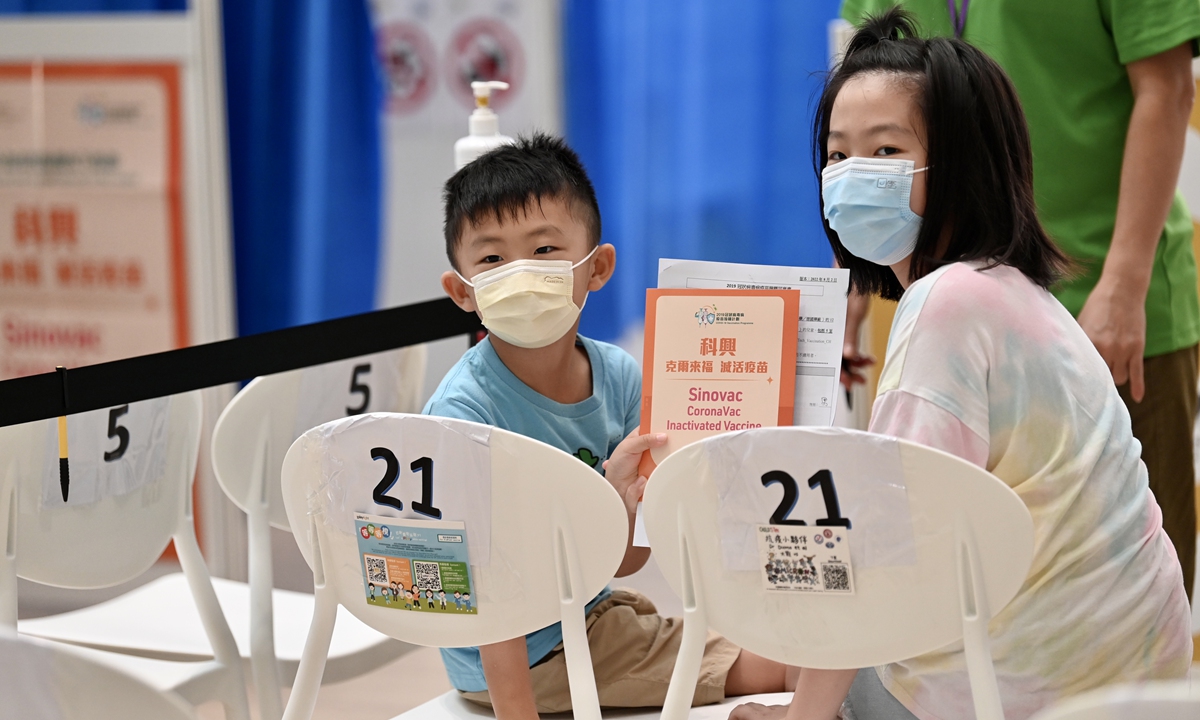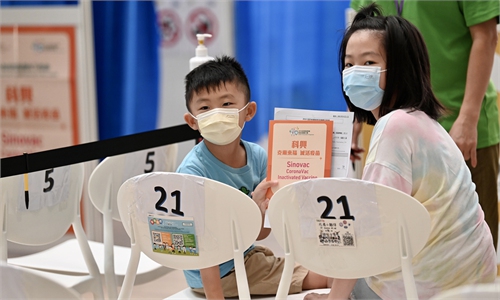Hong Kong health expert warns new clinical features among children COVID-19 patients as new school year approaches

The government of the Hong Kong Special Administrative Region has increased access to vaccinations for the elderly and children. Photo: VCG
Hong Kong health experts warned of new clinical features among children suffering from COVID-19 during the fifth wave, including hoarseness and inspiratory stridor (a sign of airway obstruction) as the new school year approaches, with more than 7,000 new cases confirmed daily for four consecutive days among the whole population.
On Saturday, a total of 8,457 new cases were confirmed and four deaths were reported, said Chuang Shuk-kwan, director of the Communicable Diseases Division of the Center for Health Protection of the HKSAR Government's Department of Health.
Noticeably, there are two confirmed cases in children have been newly classified as "serious" and are being treated in the children's ICU at Princess Margaret Hospital.
One of them, a 17-month-old boy, had a fever and convulsions on the night of Friday and briefly stopped breathing. He got croup after being infected and just received his first dose of vaccine on that say. Expert advisers to the SAR government believed that the boy's condition was caused by the COVID virus. Another 10-year-old boy developed a high fever and tested positive on August 22. He sought medical treatment on Thursday for breathing difficulties.
Mike Kwan Yat-wah, the consultant at the department of pediatrics and adolescent medicine at Princess Margaret Hospital, told the Global Times that the clinical features among children during the fifth wave driven by the Omicron variant differ from those observed in the previous ones.
Kwan said he found some infected children had developed croup which indicates an inflammation of the larynx, windpipe and bronchial tubes. Its symptoms are hoarseness and inspiratory stridor. In severe cases it can produce acute obstruction of the respiratory tract and an absence of oxygen supply to an organ or a tissue.
Kwan further noted that this condition can also be caused by various infectious agents, such as parainfluenza virus. However, in the recent COVID pandemic, this condition was nearly all caused by the Omicron variant, he said.
Infections with Omicron variants are still on the rise with the proportion of new cases infected with BA.4 (or BA.5) in Hong Kong rising to 48.6 percent, while BA.2.12.1 accounted for 7.6 percent, according to Chuang. Omicron is more infectious than other strains of the virus, and it is difficult to predict when it will peak, she noted.
For the upcoming school season, Chuang predicted that the proportion of confirmed cases among students and teachers would increase, and that daily tests would be required to prevent transmission on campus.
Kwan also mentioned the possibility of prolonged COVID-19 symptoms, saying about 19 percent of children who have recovered from COVID-19 present with at least one of these symptoms in the outpatient follow-up at his hospital - Princess Margaret Hospital. The most common complaints were memory loss, cognitive deficits, insomnia, headaches and discomfort.
Kwan reminded that croup is a serious respiratory condition and requires early medical attention and treatment. Parents should seek immediate medical attention if their child develops symptoms including making noisy, high-pitched breathing sounds both when inhaling and exhaling, or developing blue or grayish skin around the nose, mouth or fingernails. If treated timely with no oxygen deprivation, the patient should recover with no lasting side effects.
Kwan also suggested that apart from maintaining good personal and environmental hygiene, COVID-19 vaccination is effective in the prevention of acute, short- and long-term complications of COVID-19 infection. He strongly advocated eligible persons and their family members to receive the recommended number of doses of COVID-19 vaccine.
Hong Kong Chief Executive John Lee Ka-chiu on Saturday night stressed current vaccination rates among senior citizens and children were non-ideal and this group of population reported higher rates of severe illness and death after COVID-19 infection. Among them, about 30 percent of people over 80 years old, 20 percent of people between 3 and 11 years old and 90 percent of people under 3 years old have not been vaccinated.
Huang Ziting contributed to this story

